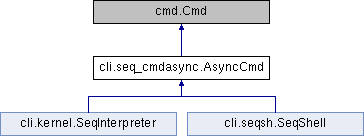Adapts cmd.Cmd class to handle asynchronous callbacks.
More...
|
| def | __init__ (self, loop, completekey='tab', stdin=None, stdout=None) |
| |
| def | cb (self, f, arg, future) |
| |
| def | exc_handler (self, exc) |
| |
| def | onecmd (self, line) |
| | Interpret the argument as though it had been typed in response to the prompt. More...
|
| |
Adapts cmd.Cmd class to handle asynchronous callbacks.
◆ __init__()
| def cli.seq_cmdasync.AsyncCmd.__init__ |
( |
|
self, |
|
|
|
loop, |
|
|
|
completekey = 'tab', |
|
|
|
stdin = None, |
|
|
|
stdout = None |
|
) |
| |
◆ cb()
| def cli.seq_cmdasync.AsyncCmd.cb |
( |
|
self, |
|
|
|
f, |
|
|
|
arg, |
|
|
|
future |
|
) |
| |
◆ exc_handler()
| def cli.seq_cmdasync.AsyncCmd.exc_handler |
( |
|
self, |
|
|
|
exc |
|
) |
| |
◆ onecmd()
| def cli.seq_cmdasync.AsyncCmd.onecmd |
( |
|
self, |
|
|
|
line |
|
) |
| |
Interpret the argument as though it had been typed in response to the prompt.
This may be overridden, but should not normally need to be; see the precmd() and postcmd() methods for useful execution hooks. The return value is a flag indicating whether interpretation of commands by the interpreter should stop.
◆ lastcmd
| cli.seq_cmdasync.AsyncCmd.lastcmd |
◆ loop
| cli.seq_cmdasync.AsyncCmd.loop |
◆ repl_future
| cli.seq_cmdasync.AsyncCmd.repl_future |
◆ use_rawinput
| cli.seq_cmdasync.AsyncCmd.use_rawinput |
The documentation for this class was generated from the following file:
